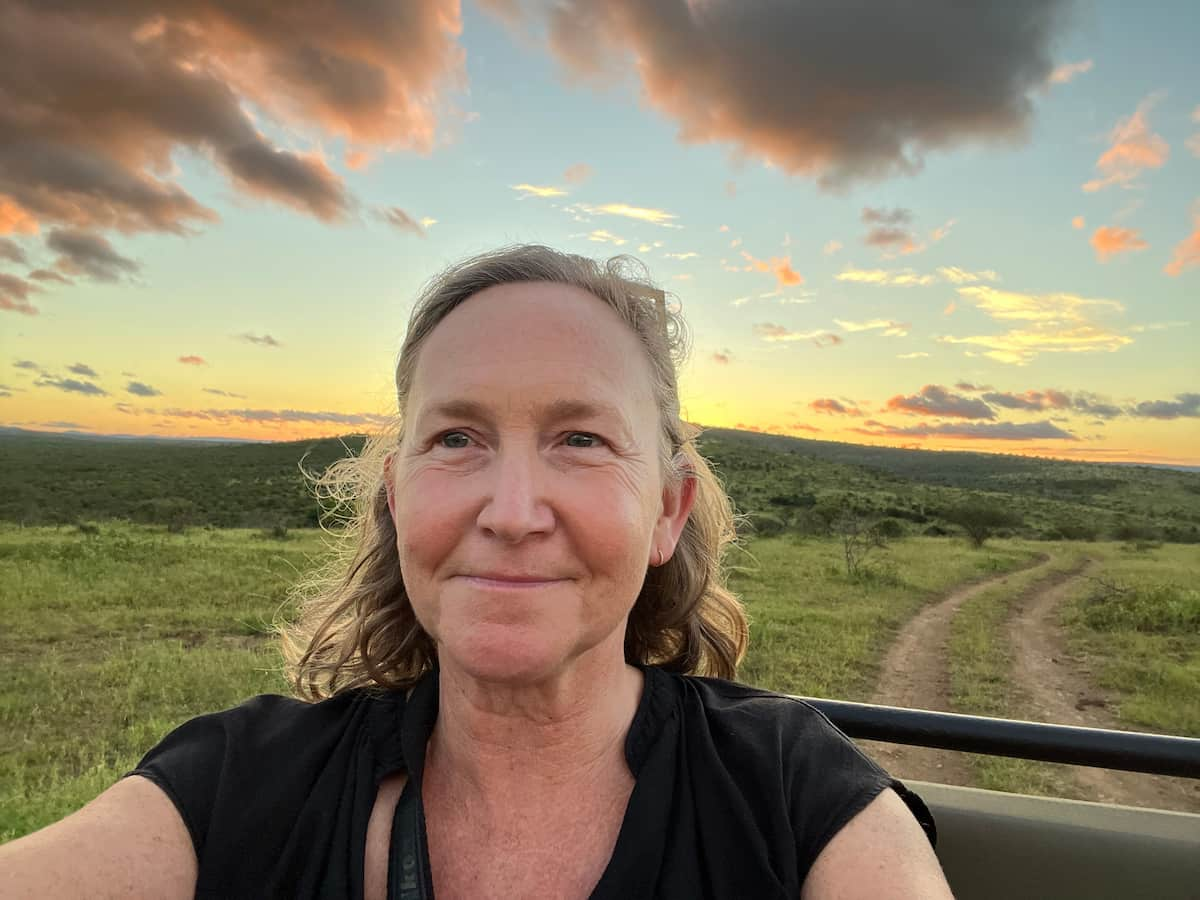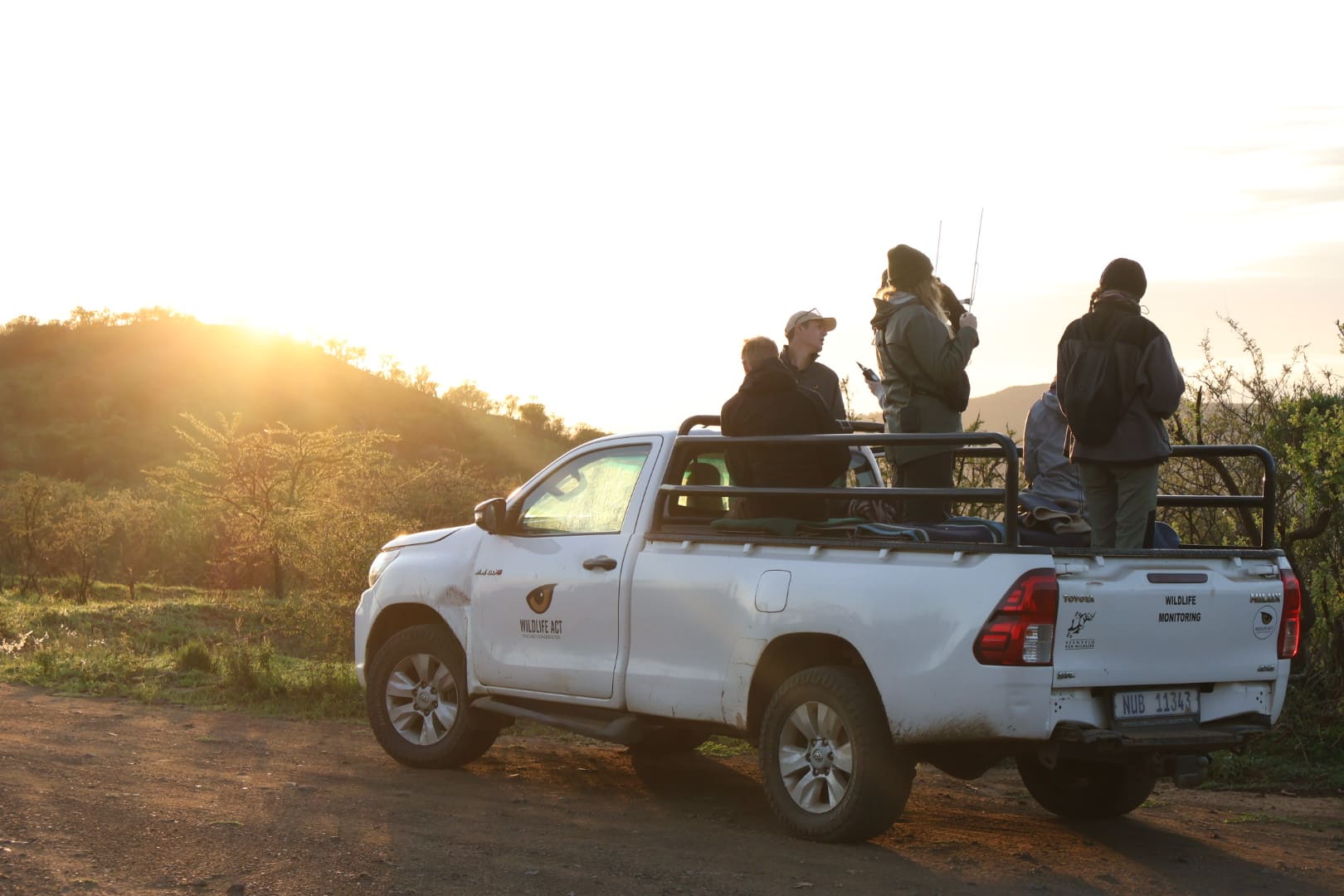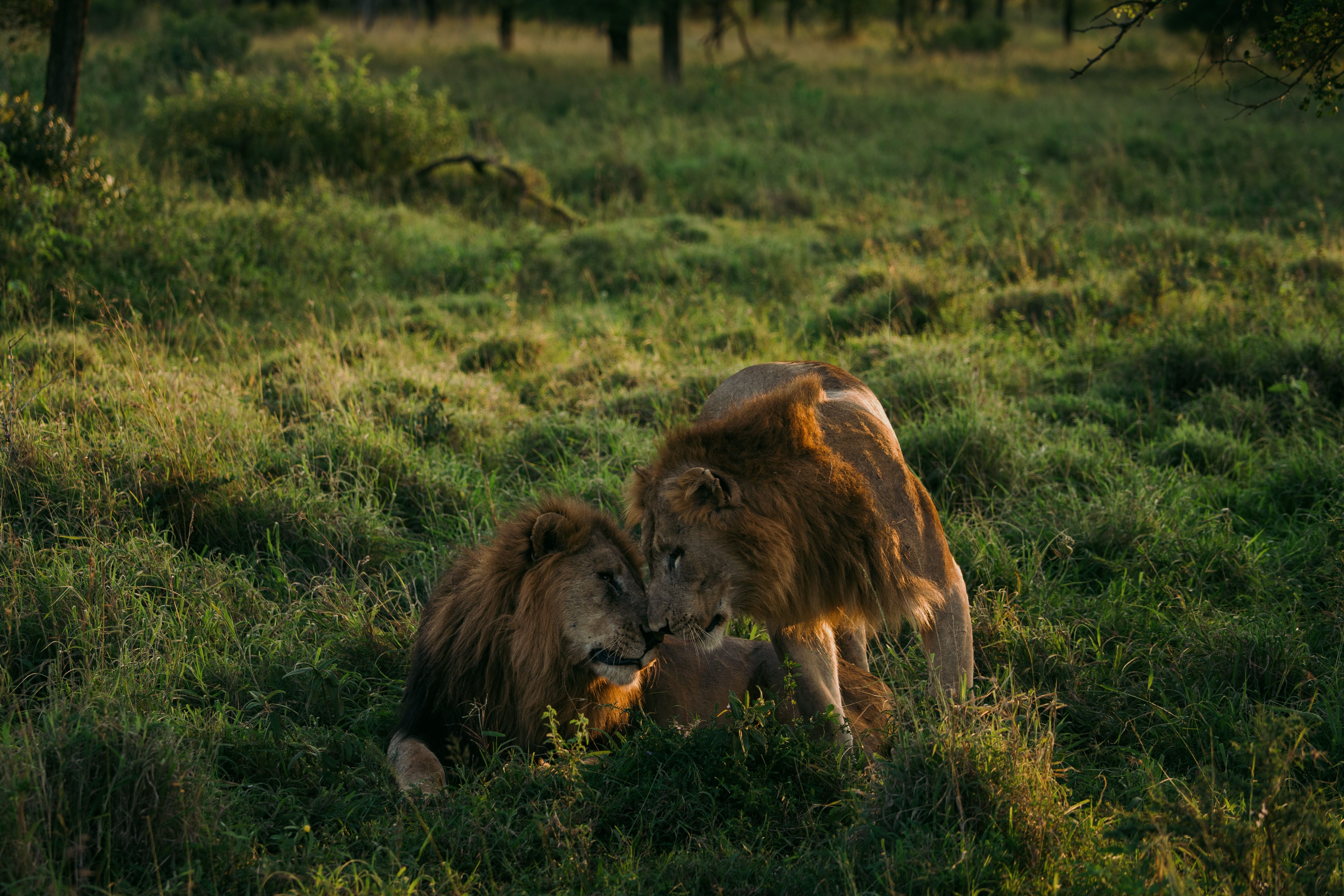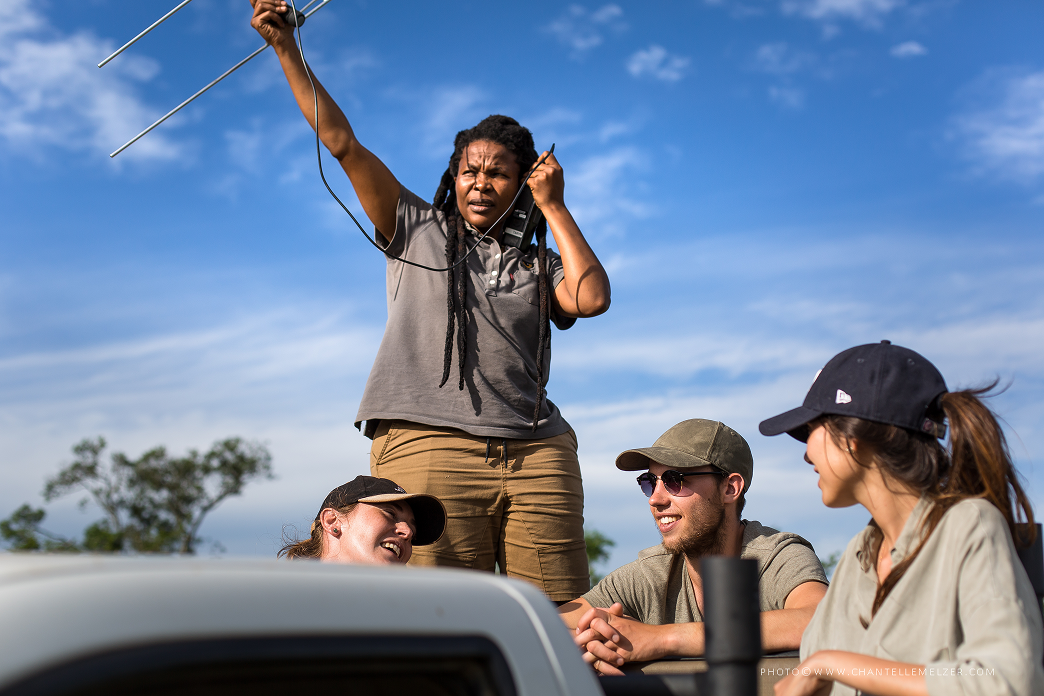Volunteer With Endangered Species in South Africa
Join Africa's highest award-winning conservation program
Apply Now
Wildlife ACT offers a unique volunteer experience as Africa's only WWF-partnered conservation program focused on protecting and restoring natural ecosystems. Join small teams of up to six volunteers to address critical challenges for endangered species in nationally proclaimed and privately owned wildlife reserves.
Everything you need to know
We offer focused conservation work in Zululand, one of Southern Africa's most biodiverse regions, declared World Heritage Sites, and the only wildlife volunteer project in Africa supported by WWF.
The Wildlife ACT experience is unmatched, offering unique conservation work and a diverse range of species. Our partner reserves are home to the "Big 5," including Black and White Rhinos, Lions, Leopards, Buffalo, Elephants, Cheetahs, and African Wild Dogs, providing unique opportunities for hands-on conservation with a diverse range of endangered species.
Unlike other organisations, volunteers can switch to a new project every two weeks at a different reserve, experiencing a variety of diverse natural environments.
Our wildlife conservation work spans across multiple South African protected areas. We’re proud to partner with private, community-owned, and government-managed reserves in Zululand, including Hluhluwe-iMfolozi Park (Africa’s oldest game reserve, established in 1895) and Manyoni Private Game Reserve. This offers volunteers the chance to experience diverse natural environments, unlike programs that limit them to a single reserve. These reserves are managed by Ezemvelo KZN Wildlife, our provincial conservation authority. Since 2008, we have partnered with organisations including Endangered Wildlife Trust, Panthera and Wildtrust (to name just a few), to tackle some of our biggest endangered and priority species conservation challenges.
We guarantee meaningful contributions to real conservation work.
Wildlife ACT, founded in 2008, is led by highly qualified and renowned conservationists. One of our co-founders, Dr Simon Morgan, holds a PhD in Black Rhino Ecology and has led groundbreaking initiatives with the U.N. and World Bank. Co-founder Chris Kelly is a globally recognised expert in wildlife monitoring, game capture, relocation, and reintroduction. Wildlife ACT offers volunteers the opportunity to make a direct impact on vital conservation efforts.
Zululand is considered by many as the heartbeat of Africa and the birthplace of wildlife conservation in Africa. The African bush is a dynamic, ever-changing environment, where our activities and movements are driven by the needs of the priority and endangered species we monitor.
A Typical Day as an Endangered Species Volunteer:
- Early in the morning, you'll join your wildlife monitor and fellow volunteers on an open 4x4 for a monitoring session.
- Your wildlife monitor will track specific animals using radio telemetry and tracking collars. You'll receive training and, after a few days, handle the telemetry tracking yourself.
- Once the animal is located, you'll map the sighting with a GPS, update identity kits, and document behavioural notes. We monitor endangered species like the African Wild Dog (or Painted Dog), Cheetah, Black Rhino, and Vulture, as well as incidental priority species like Elephant, White Rhino, Hyena, and Leopard.
- By late morning, you'll have time to relax, read, journal, nap, or enjoy the abundant bird and animal wildlife around the camp.
- In the late afternoon, we head out again and return after sunset to prepare dinner. Most meals are enjoyed sitting around the campfire, listening to the sounds of the bush and discussing the day’s activities.
- After a long day, we head to bed early, excited for the day ahead! Once a week, we input field data into the camp computer for analysis.
- Wildlife ACT’s conservation volunteers prepare their own meals and are responsible for general cleaning and maintenance of the camp.
Other Endangered Species work
Depending on your duration and timing, you may assist with wildlife darting, trapping, radio collaring, game relocation, identity tagging, camera traps, game counts, bird ringing, and alien plant control. These activities are subject to need and are not guaranteed.
This is not a Safari Experience
Working in Zululand presents many challenges, including long hours and tough conditions, but it’s an incredibly rewarding experience.
Tracking animals often takes a full day, covering large distances without success, but it’s essential. This isn’t a safari; our projects offer a true conservationist experience, allowing you to contribute meaningfully to real wildlife research and conservation in Africa.
Conservation Training and Skills:
All training will be via practical tuition in the field. The skills you will gain are:
- Using telemetry tracking equipment
- Operating handheld GPS devices
- Creating animal identification kits
- Setting up and using camera traps for endangered species
- Tracking animals using spoor identification
- Collecting and analysing animal behaviour data for conservation management
- Understanding wildlife conservation challenges for endangered species in Africa
Free Time:
Due to the nature of the work, animals must be located daily, so the wildlife monitor works seven days a week. Volunteers may take occasional Sundays off for admin or rest and typically have downtime between morning and afternoon monitoring sessions.

Wildlife ACT conducts vital endangered species monitoring in Zululand, South Africa, with volunteers playing a key role in our conservation efforts. Monitoring animal movement, habitat use, population data, poaching incidents, and breakouts is crucial for effective wildlife management. The data we collect informs strategies for introducing or removing priority wildlife species.
Each day, our wildlife monitors and volunteers track animals using VHF tracking equipment or spoor tracking methods. We also create wildlife identikits for all species we monitor. Our projects are approved and contracted by the reserve and park management authorities to carry out critical conservation work.
With over 400 endangered species in Africa, many reserves lack the resources for effective monitoring. Wildlife ACT fills this gap by providing free tracking services, and managing new and existing monitoring projects on reserves that need support. Your participation directly contributes to these essential conservation efforts.

We collect all participants from Richards Bay, the nearest airport. Book your international flight to Johannesburg (OR Tambo) and then a connecting flight to Richards Bay (RCB). Please confirm your booking with us before purchasing flight tickets.
Arrival Flight: Arrive in Richards Bay by 12:00 PM midday on Monday (or earlier). Flights arriving after 12:00 PM won’t work, as we depart at 12:15 PM midday. If you can’t find a suitable flight, you’ll need to fly in on Sunday and stay overnight near the airport.
NOTE: If arriving on a morning flight, you'll have a short wait at Richards Bay Airport until the transport departs at 12:00 PM midday. There's a small coffee shop to relax in.
Departure Flight: For departure, book a flight from Richards Bay after 12:25 PM midday on Monday. Flights earlier than 12:25 PM won’t work, as we depart the project at 12:30 PM.
Overnight Options Near The Airport: Book accommodation near Richards Bay Airport. Recommended options include Serendipity Guesthouse, Woodpecker Inn, and Gecko Inn, all within 5 km. Ensure to request a shuttle to the airport for Monday.
Caution: Avoid staying in Meerensee or near Tuzi Gazi Waterfront, as these areas are a 30-minute drive away and may cause delays.
Collection From The Airport: Your driver will be at Richards Bay Airport by 12:00 PM midday, holding a "Welcome Wildlife ACT Volunteers" sign. After meeting the driver, you’ll be transported to your project site by a 4x4 monitor vehicle, with the Wildlife ACT Monitor waiting to take you to your research camp.On the Monday of your departure, you will be transported back to Richards Bay Airport to catch your departing flight home.

32000
52225
72450
92675
32000
52225
72450
92675
05 or 19 January
02 or 16 February
02, 16 or 30 March
13 or 27 April
11 or 25 May
08 or 22 June
06 or 20 July
03, 17 or 31 August
14 or 28 September
12 or 26 October
09 or 23 November
07 December
04 or 18 January
01 or 15 February
01, 15 or 29 March
12 or 26 April
10 or 24 May
07 or 21 June
05 or 19 July
02, 16 or 30 August
13 or 27 September
11 or 25 October
08 or 22 November
06 December

Manyoni Private Game Reserve:
Manyoni Private Game Reserve was established in 2004 and comprises of 17 landowners who have dropped their internal fences to create a 23,000-hectare “Big 5” Endangered species reserve. Besides the “Big 5” (Lions, Leopards, Black and White Rhinos, Buffalos and Elephants), the reserve also has Cheetahs and Pangolins.
View our Manyoni Research Camp photos here: https://www.wildlifeact.com/galleries/manyoni-project-camp-photos
The Hluhluwe-iMfolozi Park:
Hluhluwe-iMfolozi Park (HiP) was established in 1895 and is the oldest Game Reserve in Africa. The park is 96,000 hectares in total and contains an immense diversity of fauna and flora including the “Big 5” (Lion, Leopard, Black and White Rhino, Buffalo and Elephant), as well as Endangered species including African Wild Dogs and Cheetah.
Due to the size of the protected area, logistically it is divided into two Management Sections: namely the Hluhluwe Section and iMfolozi Section, but the two sections are not separated by fences and are managed together as “one natural system.”
The HLUHLUWE Section of Hluhluwe-iMfolozi Park:
The Hluhluwe Section comprises 33,000 hectares of the total 96,000 hectares.
View our HLUHLUWE Research Camp photos here: https://www.wildlifeact.com/galleries/hluhluwe-project-camp-photos
The iMFOLOZI Section of Hluhluwe-iMfolozi Park:
The iMfolozi Section comprises 66,000 hectares of the total 96,000 hectares.
View our iMFOLOZI Research Camp photos herehttps://www.wildlifeact.com/galleries/imfolozi-project-camp-photos

Why Join Wildlife ACT as a Volunteer?

.avif)


This project spans across multiple game reserves in Zululand. These areas in the eastern parts of South Africa are lush, green and teaming with wildlife. Its a favourable habitat for many types of wildlife species and is where we focus on their protection and conservation.















